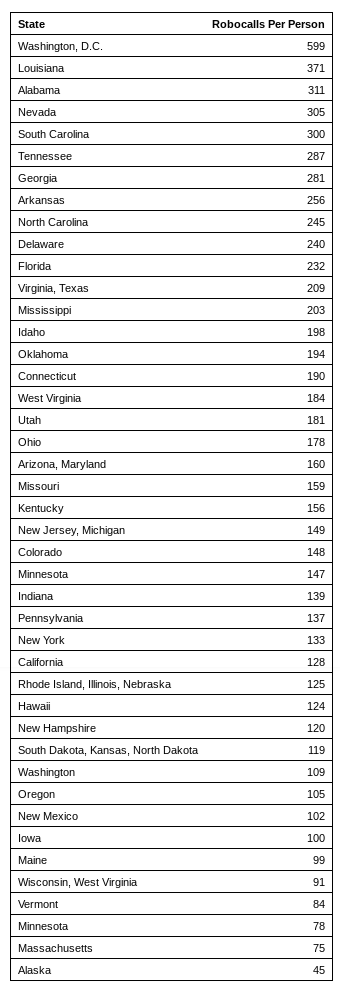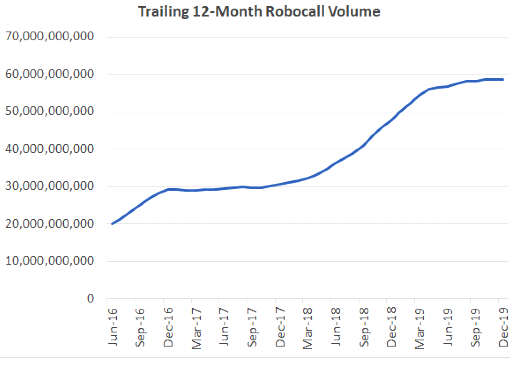In 2019, robocalls per person hit an all-time high. But help is here.
If you think you got more unwanted robocalls last year, you probably did. A new report shows that in the US, in 2019 robocalls surged to a record 22 percent compared to 2018. Over the year, US residents received an estimated 58.5 billion robocalls compared to 47.8 billion in 2018.
And compared to the 30.5 billion US robocalls sent in 2017, that’s a stunning 92 percent increase.
This huge increase led to the US Congress passing the country’s biggest anti-robocall law in decades. But as we explain here, we may still have to wait a while to see the results of the new law.
Who got the most 2019 robocalls?
In 2019 US residents got nearly 26 billion scam calls, according to YouMail, which tracks robocall statistics and offers a popular app for call blocking and visual voicemail.
Another 8 billion robocalls last year were telemarketing calls. Together, US residents received 34 billion telemarketing or scam robocalls in 2019 — that’s over 2.8 billion each month, on average.

But to really show the pain of such robocall statistics, YouMail also breaks them down by average calls per person. In the US, Washington D.C. residents endure by far the most robocalls at about 600 per person, or 1.6 per day.
In second place were Louisiana residents, who got over one robocall per day or 371 for the year. Three other states — Alabama, Nevada, and South Carolina – also received 300 or more robocalls per person in 2019.
On the other side of the scale, residents of Alaska only got 45 robocalls per year — less than one per week.
Ten states got more than 2 billion robocalls during the year, with the number of robocalls a state got generally tied to the state’s population – the larger the population, the more robocalls. The top two states, Texas and California, each saw their residents suffering through more than 6 billion robocalls in 2019.
Florida, Georgia, and New York each received more than 3 billion robocalls during the year, while Ohio, Pennsylvania, North Carolina and Illinois each got more than 2 billion robocalls.
And on the other side, only 5 smaller states got fewer than 100 million calls during the year: Alaska, Vermont, South Dakota, North Dakota, and Wyoming.
You can see a full ranking of cities, states and area codes, as well as details on the behavior of robocallers in each area code at robocallindex.com.
Will a new US anti-robocall law help?
In the last week of December 2019, Donald Trump signed the toughest anti-robocall bill the US has seen in decades — the TRACED Act. Passed overwhelmingly by Congress and the Senate, TRACED (Telephone Robocall Abuse Criminal Enforcement and Deterrence) increases penalties for scammers who purposely make illegal robocalls.
TRACED also requires mobile and landline carriers to authenticate calls to determine if the number calling you is real. And finally, the new law gives the Federal Communications Commission and Federal Trade Commission four years to pursue scammers — much longer than the previous one year.
While most people have high hopes that the TRACED Act will make a difference, we won’t likely know its results for about a year, according to YouMail. That’s because their 4-year-old Robocall Index has shown that the number of robocalls often varies from month to month, even while rising overall year to year.
So as exciting as TRACED is, it’s important to remember that we won’t know if it’s working by only looking at data for a few months. We’ll have to wait a year or more to see how successful it is.

To that end, YouMail also measures robocalls’ 12-month trailing average, which is how many robocalls were sent each year. As you can see in their adjacent chart, since Spring 2019, robocalls haven’t gotten much worse, but they haven’t gotten better.
So based on this recent leveling off and the new law, we already have reasons to be optimistic. Carriers, government, and blacklist call blockers like YouMail are working harder than ever to keep robocall numbers from exploding upwards. Earlier in 2019, carriers already started working to authenticate calls, and the FTC started cracking down on spoof callers.
We’ll let you know later if the new TRACED anti-robocall law is making a difference, so stay tuned.
YouMail is a 2019 Mobile Star Awards Winner and Spring 2020 Nominee in the “Best Message & Call Manager App” category. You can follow or connect with YouMail on their directory page here on MobileVillage.





